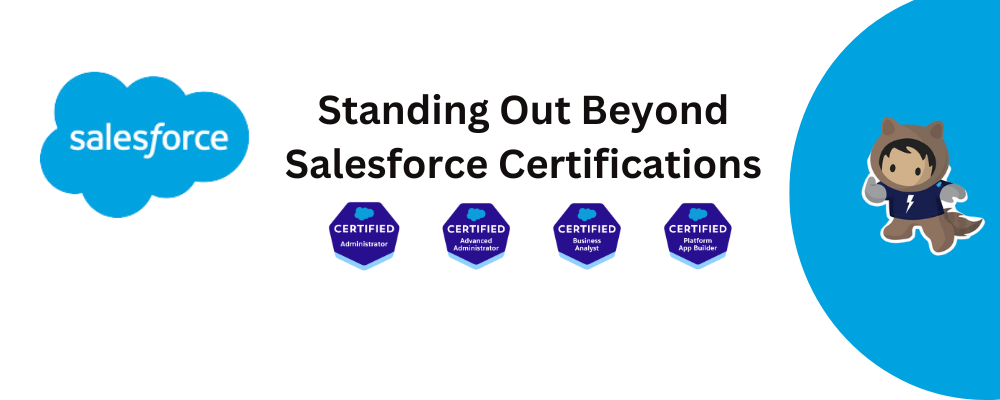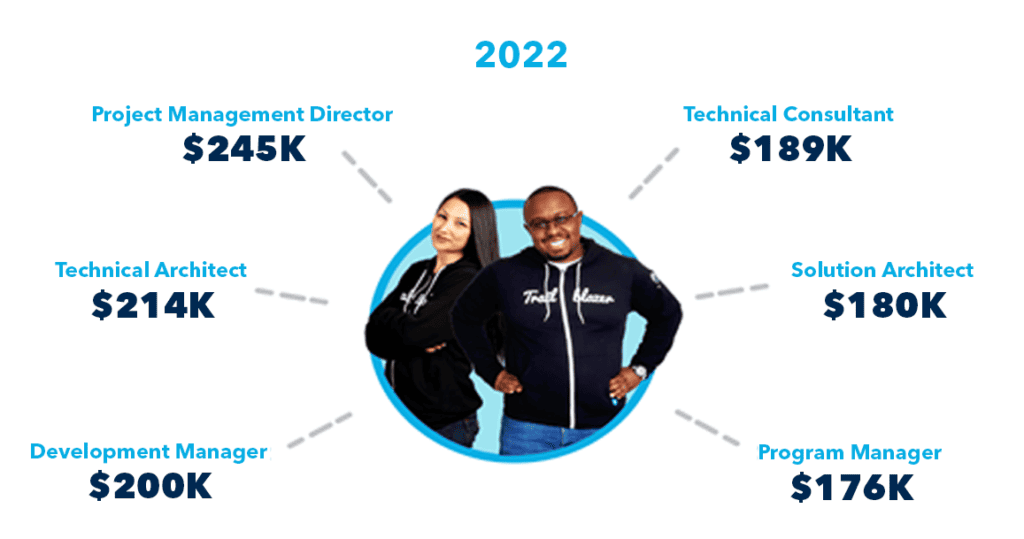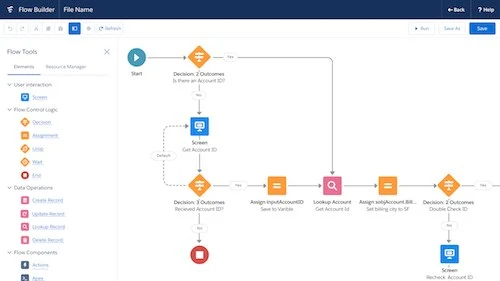Salesforce certifications have long been a benchmark for professionals looking to validate their expertise in the Salesforce ecosystem. However, in today’s competitive landscape, simply having certifications is no longer enough. To truly stand out and advance your career, it’s crucial to complement these certifications with additional skills and strategies. In this comprehensive guide, we will explore the various ways you can enhance your professional profile and outshine the competition.
The Importance of Salesforce Certifications
While Salesforce certifications remain a vital part of a professional’s toolkit, they are just the starting point. Certifications demonstrate your foundational knowledge and commitment to the Salesforce platform, providing a competitive edge in job markets and instilling confidence in employers regarding your technical capabilities.
Expanding Your Skill Set Beyond Certifications
To distinguish yourself, it’s essential to build on your certifications by acquiring a broader range of skills. Here are some key areas to focus on:
1. Advanced Technical Skills
Mastering Coding and Development
Proficiency in Apex, Salesforce’s proprietary programming language, and Visualforce for custom user interfaces, is crucial. Additionally, gaining expertise in Lightning Web Components (LWC) and understanding the underlying architecture will set you apart.
Data Management and Analysis
Effective data management is at the heart of Salesforce operations. Skills in data migration, cleansing, and ETL (Extract, Transform, Load) processes, as well as familiarity with tools like MuleSoft for integrations, are highly valuable.
2. Soft Skills and Business Acumen
Communication and Leadership
Strong communication skills are essential for articulating complex technical concepts to non-technical stakeholders. Leadership skills, including project management and team coordination, further enhance your profile.
Industry Knowledge
Understanding the specific business processes and challenges of the industry you are working in, whether it’s finance, healthcare, or retail, allows you to provide tailored solutions and strategic insights.
Gaining Practical Experience
Hands-on experience is indispensable. Here’s how to gain it:
1. Real-World Projects
Volunteering and Non-Profit Work
Engaging with non-profit organizations to offer your Salesforce expertise not only helps you gain practical experience but also builds your professional network and demonstrates your commitment to social responsibility.
Freelancing and Consulting
Taking on freelance projects or consulting roles can expose you to diverse challenges and solutions, broadening your practical knowledge and problem-solving skills.
2. Internships and Apprenticeships
Participating in internships or apprenticeships provides structured learning environments where you can apply theoretical knowledge to real-world scenarios under the guidance of experienced professionals.
Leveraging Salesforce Community and Resources
The Salesforce ecosystem offers a wealth of resources to help you grow:
1. Trailhead and Continuous Learning
Salesforce Trailhead is an invaluable resource for continuous learning. Completing trails, superbadges, and projects keeps your skills sharp and up-to-date with the latest platform developments.
2. Community Engagement
User Groups and Meetups
Joining Salesforce user groups and attending meetups fosters connections with other professionals, providing opportunities for knowledge sharing and collaboration.
Online Forums and Social Media
Engaging in online forums, such as the Salesforce Trailblazer Community, and participating in social media discussions on platforms like LinkedIn and Twitter, can keep you informed about industry trends and best practices.
Showcasing Your Expertise
To effectively showcase your enhanced skill set, consider the following strategies:
1. Building a Strong Online Presence
LinkedIn Profile Optimization
Ensure your LinkedIn profile is comprehensive and up-to-date, highlighting your certifications, skills, and professional experiences. Regularly share insights, articles, and accomplishments to maintain visibility.
Personal Website or Blog
Creating a personal website or blog where you share your knowledge, case studies, and experiences can establish you as a thought leader in the Salesforce community.
2. Networking and Public Speaking
Attending industry conferences, participating in webinars, and speaking at events can elevate your profile and expand your professional network. Sharing your insights and experiences publicly demonstrates your expertise and commitment to the field.
Here is a diagram to illustrate the various career pathways in the Salesforce ecosystem:
graph TD;
A[Salesforce Certification] --> B[Advanced Technical Skills]
A --> C[Soft Skills and Business Acumen]
B --> D[Mastering Coding and Development]
B --> E[Data Management and Analysis]
C --> F[Communication and Leadership]
C --> G[Industry Knowledge]
D --> H[Apex & Visualforce]
D --> I[Lightning Web Components]
E --> J[Data Migration & ETL]
E --> K[MuleSoft Integrations]
F --> L[Project Management]
F --> M[Team Coordination]
G --> N[Industry Specific Solutions]Conclusion
Standing out in the Salesforce ecosystem requires a strategic approach that goes beyond earning certifications. By expanding your technical skills, enhancing your soft skills, gaining practical experience, leveraging community resources, and effectively showcasing your expertise, you can build a distinguished professional profile. This multifaceted approach will not only help you excel in your career but also ensure you remain competitive in a rapidly evolving industry.
Crafting the Ultimate Strategy to Land an Entry-Level Salesforce Job in 2024




